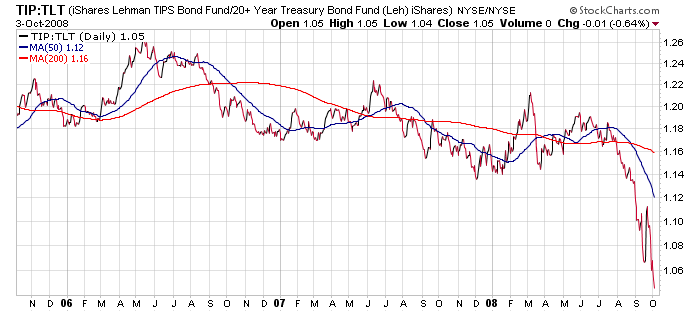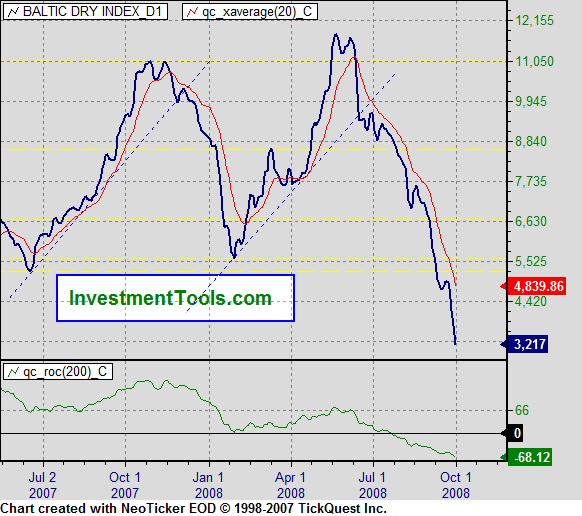I think we all know the story of Cassandra in Greek Mythology… where Cassandra could see the future, but no one would believe her.
While I read John Mauldin’s weekly email this morning, I couldn’t help but think back to the many dire warnings that Mauldin had back when “the music was playing” and everyone was convinced there was little wrong in the world of high finance.
A friend asked me a couple months ago, “didn’t anyone see the current situation coming?” My answer was, yes, more than a handful of people warned about everything that has been happening… and they were all laughed out of the room; they were dismissed as crazies…
Mauldin’s true bent is not that of perma-bear… but rather that of contrarian. When the music was playing, he pointed out the dangers. Now that the dangers are front-and-center, he cites where the markets have gotten too pessimistic. In the process, he makes a few comments that I feel compelled to write about. The comment that struck most loudly was this:
Again, the US government is the only entity with enough size and patience to act. We do not have to bail out Wall Street. They will still take large losses on their securities, just not as large a loss as they are now facing in a credit market that is frozen. As noted above, there are many securities that are being marked down and sold far below a rational price.
I certainly don’t want to be running a business, market, or industry in such a way that the US Federal Government is the only hope for long-term success. Maybe everyone else has more faith in government and congress than I do…
Where are we now? A $700 Billion Federal Government Stabilization Plan (pronounced: Bailout) is required to keep the entire country from falling into economic ruin. I would argue that if there was even a 1% chance that this situation would be reached — we have serious shortcomings in that industry, and we need regulation and rules to keep it from happening (in contrast, instead of 1%, the current situation was pretty much inevitable). And if that’s the point we’re at now, we’re better off starting a new set of banks with this money than bailing out the current ones who created such a clusterfuck (that one word truly describes the inter-connected nature of the current situation).
[Sidenote: Incidentally, more than a few of the rules actually were in place, such as a 12-to-1 maximum leverage ratio… and that rule was waived for 5 wall street firms on a special exemption so they could lever up to 30 and 40-to-1.]
Quite frankly, I find it shocking that Mauldin is standing up for so many who made mistakes that he forewarned of, yet their excuse is “everyone else was doing it,” and “I wouldn’t have made my quarterly numbers” (and that includes the ratings agencies). No wonder no one but the US Government has the patience to act — we’ve trained everyone to think short term, and the current government bailout would only re-enforce this bad conditioning.
As to the rationality of pricing these assets… if Mauldin thinks they are so irrationally priced, why doesn’t he act? Why doesn’t he put his money (and the many hedge funds who he works with) to work? If those buyers avoid leverage, then they have very little at risk, according to Mauldin’s logic. Ah, I made two critical assumptions in that rhetorical statement… that anyone in the investment world can avoid the siren song of leverage, and that Mauldin’s logic is correct that pricing is irrational.
Maybe Mauldin has forgotten one of his own points, in a secular bear market, ratios get compressed… he made the point when talking about stock P/E ratios falling in a decade-long trend, but why wouldn’t it apply to the returns on an investment like the tranched mortgage paper as well? Investors would expect to see higher returns in the future, rather than lower returns…
This other quote from Mauldin is also telling…
The average voter? They will see stock market investments off another 25% at the least. Home prices will go down even more.
I guess that a perpetually rising stock market and home price should be added to the entitlements that the US government (or more specifically, our politicians) want to guarantee to the US public. I recognize Mauldin is writing an open letter to a politician, and that is what resonates… but I for one, am disgusted that those in favor of the bailout to cite further declines in the stock market and house prices as rationale and motivation for the bailout. Stocks will stop falling on their own accord; house prices will stop falling when they are affordable again. No government bailout will allow us to skip the corrections in price that are required.
Let me try and have my own little Cassandra prediction… the bailout will be passed, maybe even tomorrow. And the markets bounce, maybe even for a month or two. Everything that Still-President Bush warned of in his speech the other night (failing banks, stock market falling, retirement accounts falling, home values continuing to fall, foreclosures continuing to rise, and more expensive credit for businesses and farmers) still happens. But, luckily, the elections will be over by then… And by then, all the politicians who spend other people’s money on bailouts will either have their job renewed, or it will be someone else’s problem.
But now, I don’t have all of Cassandra’s problems… after all, in mythology, Cassandra didn’t have her own brokerage account. I’m positioned for a bounce, but I also don’t think the bear market is over.

